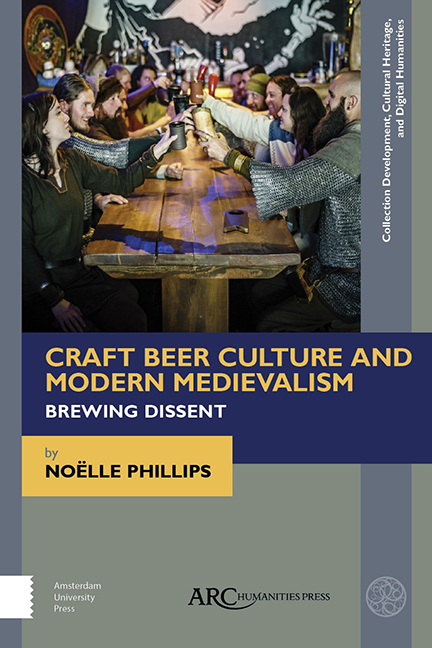Book contents
- Frontmatter
- Contents
- List of Illustrations
- Acknowledgements
- Chapter 1 Introduction: Medievalism and Craft Beer
- Chapter 2 Reading Beer in the Middle Ages
- Chapter 3 Resistance and Revolution: Craft Beer Versus Corporate Giants
- Chapter 4 Beer Heroes and Monastic Medievalism
- Chapter 5 Militant Medievalism: Norsemen, Mythology, and Masculinity
- Chapter 6 Pale Ales and White Knights: Craft Brewing, Whiteness, and Medievalism
- Chapter 7 Conclusion: The Alchemy of Alcohol
- Select Bibliography
- Index
Chapter 7 - Conclusion: The Alchemy of Alcohol
Published online by Cambridge University Press: 20 November 2020
- Frontmatter
- Contents
- List of Illustrations
- Acknowledgements
- Chapter 1 Introduction: Medievalism and Craft Beer
- Chapter 2 Reading Beer in the Middle Ages
- Chapter 3 Resistance and Revolution: Craft Beer Versus Corporate Giants
- Chapter 4 Beer Heroes and Monastic Medievalism
- Chapter 5 Militant Medievalism: Norsemen, Mythology, and Masculinity
- Chapter 6 Pale Ales and White Knights: Craft Brewing, Whiteness, and Medievalism
- Chapter 7 Conclusion: The Alchemy of Alcohol
- Select Bibliography
- Index
Summary
The sway of alcohol over mankind is unquestionably due to its power to stimulate the mystical faculties of human nature, usually crushed to earth by the cold facts and dry criticisms of the sober hour. Sobriety diminishes, discriminates, and says no; drunkenness expands, unites, and says yes. […] It makes him for the moment one with truth. […] The drunken consciousness is one bit of the mystic consciousness.
WITH THIS BRIEF chapter, I conclude my foray into the lives and legends of craft beer and the ways in which medievalism and masculinity have shaped the industry. As I do so, I must acknowledge a question that haunted me when I first conceived of this project: does it matter that this book is about beer? Could my analysis of contemporary medievalism apply equally to any other food or beverage, or any other artisanal product? Perhaps I could have discussed independent coffee roasters or soap makers instead. Perhaps the beer is immaterial; it is the crafted nature of the product that lends itself so readily to medievalism and anti-corporatism.
Of course, I decided that the beer is certainly not immaterial; the beer, indeed, is the point. In response to a question about his long-standing connection to the brewing industry, Fritz Maytag, founder of Anchor Steam Brewing, responded by focusing on the nature of beer itself: “Ultimately, it stems from the alcohol. Alcohol changes people's state of consciousness. Even one beer can make a person a little mellower […] and that is a bit magical.” The “magical” quality of beer, which has long undergirded its appeal and cultural resiliency over the centuries, is the focus of this concluding chapter. In addition to its social and economic centrality in a wide range of cultures over the centuries, beer is also an intoxicant and a product that emerges through the metamorphic power of fermentation. It is, in part, because of the inebriating and transformative qualities of alcoholic beverages that alcohol has such a long history with us; it is “embedded in social relations and sociocultural systems” of societies across the globe, from villages in developing nations with limited infrastructure and technology, to the most technologically advanced cities. In the epigraph that opens this chapter, philosopher and psychologist William James, brother to the writer Henry James, suggests how alcohol's properties may expand our intellectual horizons and open up the possibility for deeper contemplation, introspection, and awareness.
- Type
- Chapter
- Information
- Craft Beer Culture and Modern MedievalismBrewing Dissent, pp. 137 - 148Publisher: Amsterdam University PressPrint publication year: 2019



